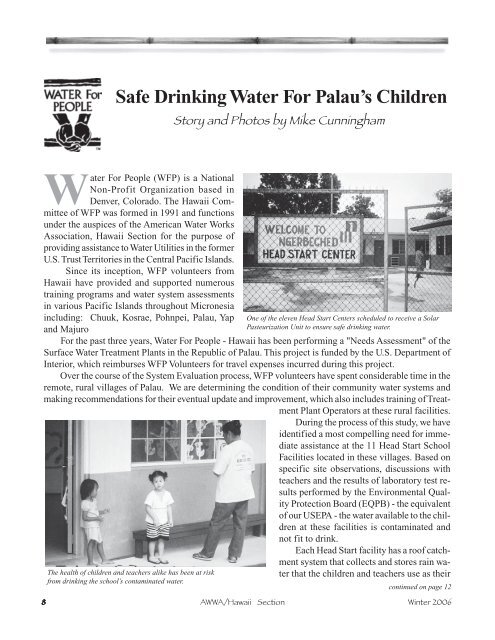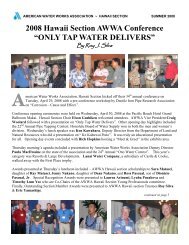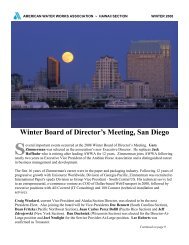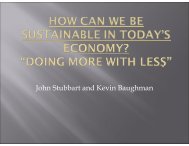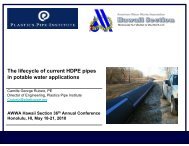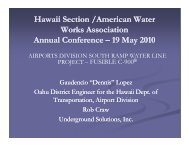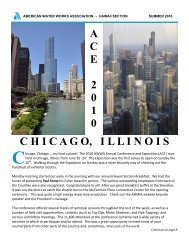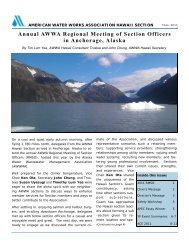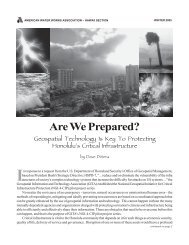2005 Winter Issue 2.45 MB - the American Water Works Association ...
2005 Winter Issue 2.45 MB - the American Water Works Association ...
2005 Winter Issue 2.45 MB - the American Water Works Association ...
You also want an ePaper? Increase the reach of your titles
YUMPU automatically turns print PDFs into web optimized ePapers that Google loves.
Safe Drinking <strong>Water</strong> For Palau’s Children<br />
Story and Photos by Mike Cunningham<br />
<strong>Water</strong> For People (WFP) is a National<br />
Non-Profit Organization based in<br />
Denver, Colorado. The Hawaii Committee<br />
of WFP was formed in 1991 and functions<br />
under <strong>the</strong> auspices of <strong>the</strong> <strong>American</strong> <strong>Water</strong> <strong>Works</strong><br />
<strong>Association</strong>, Hawaii Section for <strong>the</strong> purpose of<br />
providing assistance to <strong>Water</strong> Utilities in <strong>the</strong> former<br />
U.S. Trust Territories in <strong>the</strong> Central Pacific Islands.<br />
Since its inception, WFP volunteers from<br />
Hawaii have provided and supported numerous<br />
training programs and water system assessments<br />
in various Pacific Islands throughout Micronesia<br />
including: Chuuk, Kosrae, Pohnpei, Palau, Yap<br />
and Majuro<br />
The health of children and teachers alike has been at risk<br />
from drinking <strong>the</strong> school’s contaminated water.<br />
One of <strong>the</strong> eleven Head Start Centers scheduled to receive a Solar<br />
Pasteurization Unit to ensure safe drinking water.<br />
For <strong>the</strong> past three years, <strong>Water</strong> For People - Hawaii has been performing a "Needs Assessment" of <strong>the</strong><br />
Surface <strong>Water</strong> Treatment Plants in <strong>the</strong> Republic of Palau. This project is funded by <strong>the</strong> U.S. Department of<br />
Interior, which reimburses WFP Volunteers for travel expenses incurred during this project.<br />
Over <strong>the</strong> course of <strong>the</strong> System Evaluation process, WFP volunteers have spent considerable time in <strong>the</strong><br />
remote, rural villages of Palau. We are determining <strong>the</strong> condition of <strong>the</strong>ir community water systems and<br />
making recommendations for <strong>the</strong>ir eventual update and improvement, which also includes training of Treatment<br />
Plant Operators at <strong>the</strong>se rural facilities.<br />
During <strong>the</strong> process of this study, we have<br />
identified a most compelling need for immediate<br />
assistance at <strong>the</strong> 11 Head Start School<br />
Facilities located in <strong>the</strong>se villages. Based on<br />
specific site observations, discussions with<br />
teachers and <strong>the</strong> results of laboratory test results<br />
performed by <strong>the</strong> Environmental Quality<br />
Protection Board (EQPB) - <strong>the</strong> equivalent<br />
of our USEPA - <strong>the</strong> water available to <strong>the</strong> children<br />
at <strong>the</strong>se facilities is contaminated and<br />
not fit to drink.<br />
Each Head Start facility has a roof catchment<br />
system that collects and stores rain water<br />
that <strong>the</strong> children and teachers use as <strong>the</strong>ir<br />
continued on page 12<br />
8 AWWA/Hawaii Section <strong>Winter</strong> 2006


